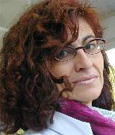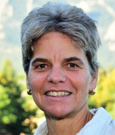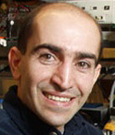
Wolf Reik
Babraham Institute
UK
EMBL Conference
EMBL is committed to sharing research advances and sustaining scientific interaction throughout the coronavirus pandemic. We are delighted to announce that the conference is going virtual and invite you to join us online. The virtual conference includes live talks from invited speakers, short talk presenters, digital poster sessions and networking opportunities.
Epigenetics refers to heritable changes in gene expression that do not involve changes to the underlying DNA sequence. At least three systems including DNA methylation, histone modifications and non-coding RNAs (ncRNA) are considered to play fundamental roles in epigenetic regulation. Research over the last two decades has uncovered the role of epigenetics in a variety of human disorders and fatal diseases. Moreover influence of age, environment, lifestyle, and disease state on epigenetic states is being increasingly appreciated and actively studied. This conference provides an international forum for cutting edge research in chromatin and epigenetics. It provides the “focal hub” for people to present their research and exchange ideas in a virtual format. Renowned speakers will cover the latest advances in the field.

Harvard Medical School
USA

Max Planck Institute of
Immunobiology and
Epigenetics
Germany

Institut Curie
France

Ludwig-Maximilians-
Universität München
Germany

University of Pennsylvania
USA

Stanford University
USA

Institute of Human
Genetics – CNRS
France

John Innes Centre
UK

Centre for Genomic
Regulation
Spain

MRC London Institute of
Medical Sciences
UK

EMBL Heidelberg
Germany

University of Copenhagen
Denmark

Max Planck Institute of
Immunobiology and
Epigenetics
Germany

Dana-Farber Cancer
Institute and Harvard
Medical School
USA

Harvard Medical School
USA

University of Colorado
Boulder
USA

Harvard Medical School
USA

Princeton University
USA

University of California
San Francisco
USA

New York University
School of Medicine
USA

Northwestern University
USA

Max Planck Institute of
Immunobiology and
Epigenetics
Germany

Institut Curie
France

Max Planck Institute of
Immunobiology and
Epigenetics
Germany

EMBL Heidelberg
Germany

EMBL Heidelberg
Germany
Got something to say? Tweet it! #EMBLChromatin
The following times are used in the programme below:
To find out the equivalent time zone in your location, enter Berlin, the CEST programme time and your city into the Time Zone Converter.
| Time | Speaker |
|---|---|
| 14:00 – 14:10 (CEST) 08:00 – 08:10 (EDT) | Opening remarks by scientific organisers |
| 14:10 – 16:10 (CEST) 08:10 – 10:10 (EDT) | Session 1: Developmental epigenetics Chairs: Asifa Akhtar and Nicola Iovino |
| 14:10 – 14:40 (CEST) 08:10 – 08:40 (EDT) | Amanda G. Fisher – MRC London Institute of Medical Sciences, UK AVAILABLE ON DEMAND AFTER LIVE STREAM |
| 14:40 – 15:10 (CEST) 08:40 – 09:10 (EDT) | Cold-induced epigenetic switching Caroline Dean – John Innes Centre, UK AVAILABLE ON DEMAND AFTER LIVE STREAM |
| 15:10 – 15:40 (CEST) 09:10 – 09:40 (EDT) | Histone H3 variants in the nucleus, make your choice Geneviève Almouzni – Institut Curie, France AVAILABLE ON DEMAND AFTER LIVE STREAM |
| 15:40 – 15:55 (CEST) 09:40 – 09:55 (EDT) | The chromatin remodeler DDM1 prevents transposon mobility through deposition of histone variant H2A.W Frederic Berger – GMI, Austria AVAILABLE ON DEMAND AFTER LIVE STREAM |
| 15:55 – 16:10 (CEST) 09:55 – 10:10 (EDT) | Distal and proximal cis-regulatory elements sense X-chromosomal dosage and developmental state at the Xist locus Edda Schulz – Max Planck Institute for Molecular Genetics, Germany, AVAILABLE ON DEMAND AFTER LIVE STREAM |
| 16:10 – 16:20 (CEST) 10:10 – 10:20 (EDT) | Break |
| 16:20 – 16:50 (CEST) 10:20 – 10:50 (EDT) | Meet all the speakers from Session 1 in individual Zoom rooms |
| 16:50 – 17:50 (CEST) 10:50 – 11:50 (EDT) | Poster Session 1 (A-F) (live chats and video calls with poster presenters) |
| 17:50 – 18:00 (CEST) 11:50 – 12:00 (EDT) | Break |
| 18:00 – 20:30 (CEST) 12:00 – 14:30 (EDT) | Session 2: Heterochromatin and HP1 Chairs: Cigall Kadoch and Giacomo Cavalli |
| 18:00 – 18:30 (CEST) 12:00 – 12:30 (EDT) | Heterochromatin-associated RNA degradation and epigenetic inheritance Danesh Moazed – Harvard Medical School, USA |
| 18:30 – 19:00 (CEST) 12:30 – 13:00 (EDT) | HP1 drives de novo 3D genome reorganization in early Drosophila embryos Nicola Iovino – Max Planck Institute of Immunobiology and Epigenetics, Germany AVAILABLE ON DEMAND AFTER LIVE STREAM |
| 19:00 – 19:30 (CEST) 13:00 – 13:30 (EDT) | Can phase-separation explain heterochromatin properties? Geeta J. Narlikar – University of California, San Francisco, USA AVAILABLE ON DEMAND AFTER LIVE STREAM |
| 19:30 – 19:40 (CEST) 13:30 – 13:40 (EDT) | Break |
| 19:40 – 19:55 (CEST) 13:40 – 13:55 (EDT) | Heterochromatin condensate formation and function Gary Karpen – University of California, Berkeley, USA AVAILABLE ON DEMAND AFTER LIVE STREAM |
| 19:55 – 20:10 (CEST) 13:55 – 14:10 (EDT) | Heterochromatin dynamics across scales Serena Sanulli – Stanford University, USA AVAILABLE ON DEMAND AFTER LIVE STREAM |
| 20:10 – 20:25 (CEST) 14:10 – 14:25 (EDT) | Genome organization in and around the nucleolus Raffaella Santoro – University of Zurich, Switzerland AVAILABLE ON DEMAND AFTER LIVE STREAM |
| 20:25 – 20:30 (CEST) 14:25 – 14:30 (EDT) | Transition (switch to individual Zoom rooms) |
| 20:30 – 21:00 (CEST) 14:30 – 15:00 (EDT) | Meet all the speakers from Session 2 in individual Zoom rooms |
| 21:00 – 21:30 (CEST) 15:00 – 15:30 (EDT) | Virtual speed networking – optional (Rotating through 5-min meet ups in random groups of 2-3 people in a breakout room) |
Digital posters, recordings and discussion channels will be available for registered participants throughout the whole virtual conference (as well as 1 week before and 2 weeks after)
| Time | Speaker |
|---|---|
| 13:00 – 13:45 (CEST) 07:00 – 07:45 (EDT) | Career fire-side chat on academic careers – optional hosted by Rachel Coulthard-Graf, EMBL Heidelberg Panelists: Magda Bienko, Karolinska Institutet Alan Cheung , University of Bristol |
| 13:45 – 14:00 (CEST) 07:45 – 08:00 (EDT) | Break |
| 14:00 – 16:40 (CEST) 08:00 – 10:40 (EDT) | Session 3: Transcription and chromatin defects and diseases Chairs: Asifa Akhtar and Wolf Reik |
| 14:00 – 14:30 (CEST) 08:00 – 08:30 (EDT) | Controlling transcription at coding and non-coding RNA loci Karen Adelman – Harvard Medical School, USA AVAILABLE ON DEMAND AFTER LIVE STREAM |
| 14:30 – 15:00 (CEST) 08:30 – 09:00 (EDT) | The distinct role of Polycomb and MLL proteins in stem cell biology and cancer Luciano Di Croce – Centre for Genomic Regulation, Spain AVAILABLE ON DEMAND AFTER LIVE STREAM |
| 15:00 – 15:30 (CEST) 09:00 – 09:30 (EDT) | Epigenetic pathways involving p53 as a tumor suppressor and oncogene Shelley L. Berger – University of Pennsylvania, USA |
| 15:30 – 15:40 (CEST) 09:30 – 09:40 (EDT) | Break |
| 15:40 – 16:10 (CEST) 09:40 – 10:10 (EDT) | Principles of epigenetics and chromatin in development and human disease Ali Shilatifard – Northwestern University, USA |
| 16:10- 16:25 (CEST) 10:10- 10:25 (EDT) | The impact of cancer associated CTCF mutations on chromatin structure and gene regulation Jane Skok – NYU School of Medicine, USA AVAILABLE ON DEMAND AFTER LIVE STREAM |
| 16:25 – 16:40 (CEST) 10:25 – 10:40 (EDT) | Chromatin regulation through intrinsic disorder: What does it take to be a boundary/insulator? Philipp Korber – Biomedical Center, LMU Munich, Germany AVAILABLE ON DEMAND AFTER LIVE STREAM |
| 16:40 – 16:50 (CEST) 10:40 – 10:50 (EDT) | Break |
| 16:50 – 17:20 (CEST) 10:40 – 11:20 (EDT) | Meet all the speakers from Session 3 in individual Zoom rooms |
| 17:20 – 18:20 (CEST) 11:20 – 12:20 (EDT) | Poster Session 2 (G-M) (live chats and video calls with poster presenters) |
| 18:20-18:30 (CEST) 12:20 – 12:30 (EDT) | Break |
| 18:30 – 21:00 (CEST) 12:15 – 14:05 (EDT) | Session 4: Chromatin regulation Chairs: Anja Groth and Peter Becker |
| 18:30 – 19:00 (CEST) 12:30 – 13:00 (EDT) | Epigenetic regulation by histone acetylation Asifa Akhtar – Max Planck Institute of Immunobiology and Epigenetics, Germany |
| 19:00 – 19:30 (CEST) 13:00 – 13:30 (EDT) | Nucleosome compaction, phase separation, and Polycomb-Group maintenance of repression Robert E. Kingston – Harvard Medical School, USA AVAILABLE ON DEMAND AFTER LIVE STREAM |
| 19:30 – 20:00 (CEST) 13:30 – 14:00 (EDT) | Polycomb, inheritance and disease Danny Reinberg – New York University School of Medicine, USA AVAILABLE ON DEMAND AFTER LIVE STREAM |
| 20:00 – 20:10 (CEST) 14:00 – 14:10 (EDT) | Break |
| 20:10 – 20:25 (CEST) 14:10 – 14:25 (EDT) | Role of chromatin condensates in establishing nuclear architecture Alessio Zippo – University of Trento, Italy AVAILABLE ON DEMAND AFTER LIVE STREAM |
| 20:25 – 20:40 (CEST) 14:25 – 14:40 (EDT) | Structural basis of cGAS inhibition by the nucleosome Robert McGinty – University of North Carolina at Chapel Hill, USA AVAILABLE ON DEMAND AFTER LIVE STREAM |
| 20:40 – 20:55 (CEST) 14:40 – 14:55 (EDT) | Distinct PRC2 subunits regulate maintenance and establishment of Polycomb repression during differentiation Ana Petracovici – University of Pennsylvania, USA AVAILABLE ON DEMAND AFTER LIVE STREAM |
| 20:55 – 21:00 (CEST) 14:55 – 15:00 (EDT) | Transition (switch to individual Zoom rooms) |
| 21:00 – 21:30 (CEST) 15:00 – 15:30 (EDT) | Meet all the speakers from Session 4 in individual Zoom rooms |
| 21:30 – 22:30 (CEST) 15:30 – 16:30 (EDT) | Live Jazz and Virtual Bar Mixer – optional (Rotating through 10-min meet ups in random groups of 5-6 people in a breakout room plus live music) |
Digital posters, recordings and discussion channels will be available for registered participants throughout the whole virtual conference (as well as 1 week before and 2 weeks after)
| Time | Speaker |
|---|---|
| 13:15-13:45 (CEST) 07:15-07:45 (EDT) | Meet the editors in individual Zoom rooms – optional Poonam Bheda, Nature Communications Krista Bledsoe, Molecular Cell, Cell Press Stefanie Boehm, The EMBO Journal Dorothy Clyde, Nature Reviews Genetics Alex Eccleston, Nature Di Jiang, Science Sara Monaco, Review Commons Esther Schnapp, EMBO reports Anke Sparmann, Nature Structural & Molecular Biology |
| 13:45-14:00 (CEST) 07:45- 08:00 (EDT) | Break |
| 14:00-16:40 (CEST) 08:00-10:40 (EDT) | Session 5: Nucleosomes structure and function Chairs: Geneviève Almouzni and Nicola Iovino |
| 14:00- 14:30 (CEST) 08:00- 08:30 (EDT) | Chromatin replication and epigenome maintenance Anja Groth – University of Copenhagen, Denmark |
| 14:30- 15:00 (CEST) 08:30- 09:00 (EDT) | Cooperation, competition and combination: Principles of targeting the X for chromosome-wide regulation Peter Becker – Ludwig-Maximilians-Universität München, Germany AVAILABLE ON DEMAND AFTER LIVE STREAM |
| 15:00- 15:30 (CEST) 09:00- 09:30 (EDT) | Structure and function of mammalian SWI/SNF chromatin remodeling complexes in human cancer Cigall Kadoch – Dana-Farber Cancer Institute and Harvard Medical School, USA AVAILABLE ON DEMAND AFTER LIVE STREAM |
| 15:30- 15:40 (CEST) 09:30- 09:40 (EDT) | Break |
| 15:40- 16:10 (CEST) 09:40- 10:10 (EDT) | Some assembly required: Structure and function of chromatin assembly factors and remodelers Karolin Luger – University of Colorado Boulder, USA AVAILABLE ON DEMAND AFTER LIVE STREAM |
| 16:10- 16:25 (CEST) 10:10- 10:25 (EDT) | The non-canonical SMC protein SMCHD1 has separable roles in long range chromatin interactions and gene silencing Marnie Blewitt – Walter and Eliza Hall Institute of Medical Research, Australia AVAILABLE ON DEMAND AFTER LIVE STREAM |
| 16:25-16:40 (CEST) 10:25- 10:40 (EDT) | Genetic and epigenetic regulation of imprinting control regions Tuncay Baubec – University of Zurich, Switzerland AVAILABLE ON DEMAND AFTER LIVE STREAM |
| 16:40-16:50 (CEST) 10:40- 10:50 (EDT) | Break |
| 16:50-17:20 (CEST) 10:40- 11:20 (EDT) | Meet all the speakers from Session 5 in individual Zoom rooms |
| 17:20-18:20 (CEST) 11:20- 12:20 (EDT) | Poster Session 3 (N-Z) (live chats and video calls with poster presenters) |
| 18:20-18:30 (CEST) 12:20- 12:30 (EDT) | Break |
| 18:30-21:00 (CEST) 12:30- 15:00 (EDT) | Session 6: Nuclear architecture Chairs: Karolin Luger and Luciano Di Croce |
| 18:30- 19:00 (CEST) 12:30- 13:00 (EDT) | Enhancer promoter communication during embryonic development Eileen Furlong – EMBL Heidelberg, Germany AVAILABLE ON DEMAND AFTER LIVE STREAM |
| 19:00-19:30 (CEST) 13:00-13:30 (EDT) | Principles and functional role of 3D genome folding Giacomo Cavalli – Institute of Human Genetics – CNRS, France AVAILABLE ON DEMAND AFTER LIVE STREAM |
| 19:30-20:00 (CEST) 13:30-14:00 (EDT) | Visualizing variable chromatin structures and robust transcriptional control Alistair Boettiger – Stanford University, USA AVAILABLE ON DEMAND AFTER LIVE STREAM |
| 20:00-20:10 (CEST) 14:00-14:10 (EDT) | Break |
| 20:10-20:25 (CEST) 14:10-14:25 (EDT) | Nonlinear control of transcription levels through enhancer-promoter interactions Luca Giorgetti – Friedrich Miescher Institute for Biomedical Research, Switzerland AVAILABLE ON DEMAND AFTER LIVE STREAM |
| 20:25-20:40 (CEST) 14:25-14:40 (EDT) | Rapid reorganization of the 3D genome reveals principal features of chromosome architecture Elzo de Wit – Oncode Institute & Netherlands Cancer Institute, The Netherlands |
| 20:40- 20:55 (CEST) 14:40- 14:55 (EDT) | Chromosomal coordination and differential structure of asynchronous replicating regions Yehudit Bergman – The Hebrew University Medical School, Israel AVAILABLE ON DEMAND AFTER LIVE STREAM |
| 20:55-21:00 (CEST) 14:55- 15:00 (EDT) | Transition (switch to individual Zoom rooms) |
| 21:00-21:30 (CEST) 15:00-15:30 (EDT) | Meet all the speakers from Session 6 in individual Zoom rooms |
Digital posters, recordings and discussion channels will be available for registered participants throughout the whole virtual conference (as well as 1 week before and 2 weeks after)
| Time | Speaker |
|---|---|
| 13:15- 13:45 (CEST) 07:15 – 07:45 (EDT) | Parallel industry sessions (optional) hosted by 10x Genomics, Arima Genomics and Dovetail Genomics |
| 13:45- 14:00 (CEST) 07:45 – 08:00 (EDT) | Break |
| 14:00- 15:45 (CEST) 08:00 – 09:45 (EDT) | Session 7: Chromatin and RNA modifications Chairs: Caroline Dean and Cigall Kadoch |
| 14:00 – 14:30 (CEST) 08:00 – 08:30 (EDT) | Nuclear condensates in gene regulation and disease Richard A. Young – Whitehead Institute for Biomedical Research, USA AVAILABLE ON DEMAND AFTER LIVE STREAM |
| 14:30 – 15:00 (CEST) 08:30 – 09:00 (EDT) | Chemical approaches to studying chromatin Tom Muir – Princeton University, USA |
| 15:00 – 15:05 (CEST) 09:00 – 09:05 (EDT) | Break |
| 15:05 – 15:20 (CEST) 09:05 – 09:20 (EDT) | Inducible condensation of chromatin regulators drives rapid transcriptional changes Ritwick Sawarkar – University of Cambridge, UK |
| 15:20 – 15:35 (CEST) 09:20 – 09:35 (EDT) | Single-molecule systems for cancer research and diagnostics: Decoding the epigenome of pediatric gliomas Efrat Shema – Weizmann Institute of Science, Israel AVAILABLE ON DEMAND AFTER LIVE STREAM |
| 15:35 – 15:50 (CEST) 09:35 – 09:50 (EDT) | Control of enhancer activity by DNA methylation Arnaud Krebs – EMBL Heidelberg, Germany AVAILABLE ON DEMAND AFTER LIVE STREAM |
| 15:50 – 16:00 (CEST) 09:50 – 10:00 (EDT) | Break |
| 16:00- 16:45 (CEST) 10:00 – 10:45 (EDT) | Keynote: Single cell multi-omics landscape of development and ageing Wolf Reik – Babraham Institute, UK AVAILABLE ON DEMAND AFTER LIVE STREAM |
| 16:45- 16:55 (CEST) 10:45 – 10:55 (EDT) | Poster prize talk 1 AVAILABLE ON DEMAND AFTER LIVE STREAM |
| 16:55- 17:05 (CEST) 10:55 – 11:05 (EDT) | Poster prize talk 2 AVAILABLE ON DEMAND AFTER LIVE STREAM |
| 17:05- 17:15 (CEST) 11:05 – 11:15 (EDT) | Poster prize talk 3 AVAILABLE ON DEMAND AFTER LIVE STREAM |
| 17:15- 17:25 (CEST) 11:15 – 11:25 (EDT) | Closing remarks |
| 17:25- 17:55 (CEST) 11:25 – 11:55 (EDT) | Meet all the speakers from Session 7 in individual Zoom rooms |
Digital posters, recordings and discussion channels will be available for registered participants throughout the whole virtual conference (as well as 1 week before and 2 weeks after)
Registration Fees (include access to all of the talks, digital poster sessions and online group discussions, and help us cover our costs to run the event.)
For further information please refer to the FAQ page):
| Academia | 190 Euro |
| PhD Student | 140 Euro |
| Industry | 240 Euro |
| EMBL Staff | Intranet access |
Accredited journalists may be eligible to register for a reduced press rate or in some cases for complimentary registration. Registrants may be required to provide accreditation or equivalent proof of press membership after registration. Please contact Tim Nürnberger for more information.
Registration will be on a first-come first-served basis. Your place can only be confirmed after payment of the registration fee.
Types of payments accepted are international bank transfers (only up to 8 weeks before event) and credit card payments.
Only registered participants are eligible to submit an abstract. We only accept online abstract submissions.
After registration you can submit your abstract via a separate link that will be provided in the email confirmation. Alternatively, you can access the link on the confirmation page directly after registering. The same login credentials are used for both processes.
Please note:
Title: The title should not exceed 20 words. Only the first word of the title should start with a capital letter and the rest of the title should be in lowercase.
Authors and Affiliations: Please fill in the author’s details as requested in the online form. The compulsory details are: First Name, Last Name, Organisation Name (Affiliation or Company), Country and Email. Mark only one author as the role of First author and please don’t forget to indicate who will be presenting. The order of the authors will be listed as follows: First Author, Co-First Author (alphabetically if multiple), co-author(s) (in the order added by the submitter).
Presentation Types: When submitting your abstract, you can apply for an oral or digital poster presentation. A selection process will take place with the results announced 2-3 weeks after the abstract submission deadline.
Please check our FAQs pages for further information on how to submit an abstract.
Registration Fee Waivers
All academic and student registrants are invited to apply for a registration fee waiver, provided by the EMBL Advanced Training Centre Corporate Partnership Programme. The registration fee waiver covers the registration sum that you have paid to attend the meeting. Conference participants are not required to pre-pay the registration fee to be selected for a fee waiver for a virtual meeting. If you have already paid the registration fee and are awarded a fee waiver, it will be reimbursed after the meeting. Course participants are required to pay the course fee in advance, which will then be reimbursed after the course to the fee waiver recipients.
Childcare Grants
For participants with children, there is the possibility to apply for a childcare grant provided by the EMBL Advanced Training Centre Corporate Partnership Programme, to offset childcare costs incurred by participants or speakers when participating at a virtual event. Eligible costs include fees for a babysitter or childcare facility or travel costs for a care giver. Please note that priority will be given to early stage researchers. A maximum amount of 500 EUR can be awarded per participant selected for the virtual childcare grant. Costs will be reimbursed after the meeting only once a reimbursement form and original receipts have been received. In order to apply for this grant, you must be registered by the abstract submission deadline.
Applications for financial assistance can be submitted via the submission portal* (for the submission of abstracts for conferences or the submission of motivation letters for courses) by completing the Financial Assistance Application Section (underneath the section for entering abstract/motivation letter information). The link to the portal can be found in the registration confirmation email that you will receive after registering for the conference or course.
For conferences, if you are not submitting an abstract, you can still apply for financial assistance in the submission portal by following the instructions here. Note that priority will be given to those submitting an abstract to present at the conference. In your application you will be asked to answer questions regarding your motivation for applying, and, for registration fee waivers, the reasons why your lab cannot fund your attendance and how your attendance will make a difference to your career. Application for financial support will not affect the outcome of your registration application.
*For some events, applications for Childcare Grants will still be done by email. Information about the grant will be sent out shortly after the abstract/motivation letter deadline. Please contact the event Conference Officer if you have any questions.
The scientific organisers will select the recipients of registration fee waivers during the abstract selection process for conferences and the participant selection process for courses. Results will be announced approximately 3 – 4 weeks before the event start date. Selection results do not impact your admission to the meeting. Registration fee waiver selection is based on your current work or study location, your motivation for applying, the reasons for needing financial support and the impact this event will have on your career. Childcare grants are allocated based on career stage, with priority given to early stage researchers.
A list of external funding opportunities can be found here, and information on attending a conference as an event reporter here.
For further information about financial assistance please refer to the FAQ page.
Please do:
Please don’t:
Additional information can be found in our Code of Conduct.
It is important to stay healthy and move around, especially when you are attending an event virtually. We have put together a few coffee break stretches and yoga videos. You can find these under ‘resources’ on the conference platform.
Please use the Q&A function. It is possible to send a direct message to participants, poster presenters, and speakers within the conference platform.
If you have any other questions, you can go to the Help Desk on the conference platform. Click on ‘more’ on the top menu and click Help Desk.
The programme is planned based on Central European Time (CET) or Central European Summer Time (CEST) unless otherwise stated. As many virtual participants are attending from around the world, we do our best to accommodate as many timezones as possible when creating the programme. Please take your time zone into consideration when planning your attendance. Remember to set your time zone in your account.
We are using a virtual event platform for this conference. More information about the platform will be shared ahead of the conference.
Zoom: The virtual event platform will use Zoom for live sessions and we recommend you download the Zoom app in advance of the conference to ensure you get full interactivity.
Gold Sponsors
Silver Sponsor
Event Sponsor
Media Partners
EMBO Journal, an EMBO Press journal
Journal of Cell Science, a The Company of Biologists journal
Open Biology, a Royal Society journal
Sponsorship Opportunities
We offer a variety of event sponsoring possibilities, with the flexibility to select a set sponsorship package or combine individual sponsorship options to suit your event budget. Discounts are available for companies sponsoring multiple events at EMBL Heidelberg. View other conferences, or contact sponsorship@embl.de for further information.
If you are interested in becoming a media partner of this event, please visit our media partnerships webpage.
Concurrent industry webinars will be hosted by sponsoring companies prior to the virtual EMBL Conference: Chromatin and Epigenetics
on Monday, 17 May at 12:45 – 13:45 (CEST, Berlin).
To find out the equivalent time zone in your location, enter Berlin, the CEST programme time and your city into the Time Zone Converter.
Participation in this webinar is free of charge for registered conference attendees. The number of available places is limited (first come, first served). All registered conference attendees will receive an email with a registration link.
Click on the list below to read the abstracts and find out more about the webinars
Hannes Arnold, Senior Science and Technology Advisor, 10x Genomics
Deep insights into tumor biology, developmental biology, and other biological processes and disease states require a comprehensive view of gene expression patterns and their corresponding epigenetic regulation at single cell resolution. Leverage two modalities at once in single cells to more deeply characterize complex cell populations and capture cellular heterogeneity, and discover gene regulatory interactions driving cell differentiation, development, and disease. Join our workshop to explore how you can multiply your power of discovery with Chromium Single Cell Multiome ATAC + Gene Expression, our first commercial product enabling you to simultaneously profile RNA-seq and ATAC-seq from the same single cells.
Mapping etiologic cell types for obesity using single-nucleus gene expression and chromatin profiling
Tune H Pers, Associate Professor, Novo Nordisk Foundation, Center for Basic Metabolic Research, Denmark
We and others have previously leveraged large-scale bulk transcriptomics data to interpret genome-wide association study results. In this presentation I will describe how we can use single-nucleus gene expression and chromatin accessibility data to identify candidate brain cell types underlying obesity and other complex traits. I am going to focus on our recent work in which we showed that transcripts and regions of accessible chromatin near obesity-associated genetic variants are enriched in the area postrema and the nucleus of the solitary tract neurons that express the glucagon-like peptide 1 and/or calcitonin receptors – two actively pursued anti-obesity drug targets.
It’s easy to get lost in the wide range of chromatin conformation techniques today. Arima HiC+ for Capture Hi-C technology enables researchers to tailor their conformation studies to specific regions of interest. Much like whole genome sequencing versus targeted approaches, the Arima Promoter Capture panel is the gene regulation analog to exome capture, covering promoters genome-wide at a significantly higher resolution and with fewer reads.
1. Learn about the latest development in chromatin conformation capture. Specifically, we will introduce you to capture Hi-C, including region, promoter & variant capture.
2. How are researchers using capture Hi-C today, and what discoveries have they made? Learn how capture Hi-C can help you:
3. Deep dive into promoter capture. Learn how your lab can start using capture Hi-C.
This webinar is for epigenetics researchers interested in applying the latest techniques in 3D genomics. Whether you’re working on translational applications or discovery research, there are many new developments in the chromatin conformation space that can take your research to new levels. Come learn about the latest development in capture Hi-C in this webinar from Arima Genomics.
Bart Dequeker, Kikuë Tachibana Lab, Institute of Molecular Biotechnology of the Austrian Academy of Sciences (IMBA)
Eukaryotic genomes are compacted into loops and topologically associating domains (TADs), which contribute to transcription, recombination and genomic stability. Cohesin extrudes DNA into loops that are thought to lengthen until CTCF boundaries are encountered. Little is known about whether loop extrusion is impeded by DNA-bound macromolecular machines. We demonstrate that the replicative helicase MCM is a barrier that restricts loop extrusion in G1 phase. Single-nucleus Hi-C of one-cell embryos revealed that MCM loading reduces CTCF-anchored loops and decreases TAD boundary insulation, suggesting loop extrusion is impeded before reaching CTCF. Single-molecule imaging shows that MCMs are physical barriers that frequently constrain cohesin translocation in vitro. Simulations are consistent with MCMs as abundant, random barriers. We conclude that distinct loop extrusion barriers contribute to shaping 3D genomes.
Date: 17 - 20 May 2021
Location: Virtual
Deadline(s):
Abstract submission: Closed
Registration: Closed
Contact: Tim Nürnberger